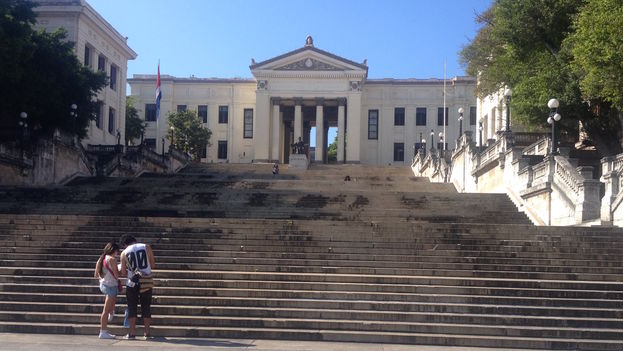
![]() 14ymedio, Luz Escobar, 23 January 2016 – The upcoming school year will see transformations in access to higher education. The changes affect both regular and distance courses, and eliminate the entrance exams for the latter. This measure seeks to increase enrollment in universities, which in the last five years has decreased by 60,000 students, according to the Minister of Higher Education, Rodolfo Alarcón Ortiz.
14ymedio, Luz Escobar, 23 January 2016 – The upcoming school year will see transformations in access to higher education. The changes affect both regular and distance courses, and eliminate the entrance exams for the latter. This measure seeks to increase enrollment in universities, which in the last five years has decreased by 60,000 students, according to the Minister of Higher Education, Rodolfo Alarcón Ortiz.
Throughout this week, several television programs and reports in the press have detailed flexibilities which will be implemented starting in September. The requirement to take entrance exams in Spanish, mathematics and history – currently in force – has become “a barrier, not only cognitive but also psychological, for people who are workers who have been out of school for years,” the minister declared.
Starting in the 2016-17 academic year, these materials will be included in the regular class program, as well as in distance learning, and occupy 5% of the total hours of study. Thus the evaluation of this knowledge will be after the first year of study, allowing students a chance to catch up on essential and basic content.
The current enrollment in regular and distance courses is one-tenth that recorded in 2007-2008. Although the minister did not specify other causes of the decline, a source from the Ministry of Education consulted by this newspaper said that “obtaining a diploma and graduating in a specialty is no longer the goal of many young Cubans.”
According to this official, “The attractions of the non-state sector, such as self-employment and working in a restaurant, seduce more and more young people.”
The problem is compounded if we add “the migration of labor to other countries,” Alarcon Ortiz acknowledged. The deficit is felt especially in the economic fields of stody, and in agriculture and the technical sciences, the official added. Although the most critical situation is faced by the departments that train future teachers, the minister acknowledged that there is “lack of motivation” to opt for these specialties.
The three traditional exams will be maintained for those who choose the regular course, and entrance will require a minimum of 60 points on a 100-point scale. There are three scheduled sets of dates for these exams: the “ordinary” to be held on May 3-10; the “extraordinary” scheduled for June 21-28; and the “special” on August 26-31.
University admission is awarded at the conclusion of each series of exams, and those who resort to the “extraordinary” or “special” series will be at a disadvantage in terms of the number of remaining places. Ministry of Education officials affirm, however, that there is a guaranteed place in the regular course for all students who pass the three admission exams.
